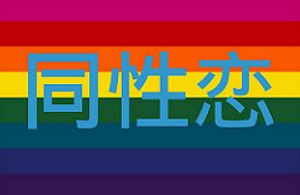The news that Taiwan will be the first in Asia to legalize same-sex marriage went viral on mainland China’s websites and social media. Once again, gay rights has become a hot topic and more and more Chinese people are joining the public discussion about it.
Mainland China always insists that Taiwan is an inalienable part of China, and one main reason is that the people in both mainland and Taiwan share the same Chinese blood and the same root of Confucian culture. Now Taiwan has shown to the Mainland people that the very same Chinese blood and culture, albeit under different administration, can also accept same-sex marriage. Facing the reality across the Strait, the mainland Chinese can’t help but re-examine their position on gay rights.
Undoubtedly, against the backdrop of globalization, mainland China is influenced by the international trend of the gay rights movement as well, though the scope, speed, and degree of such influence could be argued.
In 1997, the Chinese government abolished the law on hooliganism, which criminalized homosexuality. In 2001, the Chinese Society of Psychiatry declassified homosexuality as a mental disorder. After 2001, then, homosexuality was no longer defined as a crime or an illness in the official context, and since then, China’s LGBT community has been able to find a comfortable (comparatively speaking), semi-overt living space: Gay parks and gay bars are booming in Chinese big cities; the topic of homosexuals is no longer a taboo for Chinese media. More and more reports centering around the Chinese homosexuals’ predicament and condemning those homosexuals who marry straight a wife or husband to cover their sexual orientations have been published.
Compared to their counterparts in the West, China’s homosexuals don’t need to face pressure from extreme religious groups, and the Chinese government tends to acquiesce to their current status as long as they don’t keep pushing for more rights.
Yet, China’s LGBT community is still pushing.
In 2015, a Chinese college student sued China’s Education Ministry over academic textbooks that describe homosexuality as a “disorder,” in the first case of its kind in the country. In 2016, one year after the U.S. Supreme Court legalized gay marriage nationwide, a Chinese gay couple demanded the same right from the Chinese government: they sued the Chinese registry for refusing their application to marry in December 2015.
Although both the college student and the gay couple lost their cases in the end, their endeavors, as well as all the reports focusing on them, inspired more people fighting for gay rights.
Many articles argue that the biggest source of pressure on China’s LGBT community comes from their families. Yet a recent case demonstrates that the traditional family value — that Chinese sons are responsible for carrying on the family name — is changing, too.
Recently, many Chinese parents of LGBT children gathered in a Shanghai park famous for its “marriage market.” Just like the parents of unmarried straight children, these parents of LGBT children also aimed to find suitable partners for their children in the park. A mother said: “If parents of straight people can be here, parents of gay people can also be here… I’m here to find a boyfriend for my son.”
Unsurprisingly, these parents of gay children ended up being dispersed by security personnel.
Regardless, the national discussion of gay rights and the trend of public opinion on LGBT are moving toward a more rational and receptive direction, especially after Taiwan’s same-sex marriage ruling.

































